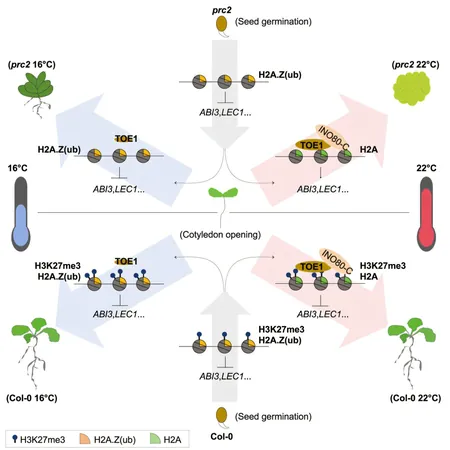
Unlocking Nature's Secrets: How Temperature Shapes Plant Cell Fate!
2025-04-28
Author: William
A Revolutionary Discovery in Plant Biology
A groundbreaking study led by Professor Xiao Jun at the Institute of Genetics and Developmental Biology of the Chinese Academy of Sciences reveals an astonishing connection between temperature and plant cell fate. This remarkable research, published in Developmental Cell, highlights how environmental temperature can dictate cellular changes through epigenetic modifications.
The Power of Epigenetics in Plants
At the heart of this discovery lies the manipulation of epigenetic signals—chemical tags on DNA-binding proteins that decide which genes are active or silenced. In the model plant Arabidopsis thaliana, the journey from seed to seedling requires the shutdown of embryonic genes essential for early growth. This crucial silencing is orchestrated by protein complexes known as PRC1 and PRC2, which modify chromatin, making it harder for genes to be expressed.
Temperature: A Game Changer!
Interestingly, researchers found that low temperatures (around 16°C) can counteract the loss of PRC2, helping prc2 mutants avoid developmental glitches. This revelation opens up new avenues in plant biology: could temperature be fine-tuned to enhance plant growth?
The Role of TOE1 in Temperature Response
Through an intricate blend of genetic, transcriptomic, and epigenomic analyses, the study identified TOE1 as a crucial factor in this temperature response mechanism. Normally, TOE1 aids in removing H2A.Z—a critical protein at embryonic gene sites—promoting the transition to post-germination development. However, when temperatures drop, TOE1 levels drop too, allowing H2A.Z to accumulate and triggering PRC1 to impose a repressive tag, effectively silencing embryonic genes.
Implications for Agriculture and Beyond
These findings not only shed light on how plants adapt to their environments but also provide a new strategy for optimizing crop regeneration through temperature management. Moreover, the conserved nature of H3K27me3, an epigenetic marker linked to multicellular differentiation, underscores its significance across species—from plants to animals, and even in human cancer research.
A New Perspective on the Genome
What this research illustrates is that our understanding of genomes is evolving. Rather than merely a static instruction manual, the genome is a dynamic entity, constantly interacting with environmental factors through epigenetic controls. This knowledge could inspire innovative cancer treatment strategies, mimicking how plants adeptly navigate their world.
Conclusion: Nature's Ingenious Adaptation Mechanisms
As scientists continue to unravel the complexities of plant biology, this study underscores the intricate dance between temperature, epigenetics, and cellular identity. The future of agricultural advancements and therapeutic interventions in human health may very well depend on these revelations.









 Brasil (PT)
Brasil (PT)
 Canada (EN)
Canada (EN)
 Chile (ES)
Chile (ES)
 Česko (CS)
Česko (CS)
 대한민국 (KO)
대한민국 (KO)
 España (ES)
España (ES)
 France (FR)
France (FR)
 Hong Kong (EN)
Hong Kong (EN)
 Italia (IT)
Italia (IT)
 日本 (JA)
日本 (JA)
 Magyarország (HU)
Magyarország (HU)
 Norge (NO)
Norge (NO)
 Polska (PL)
Polska (PL)
 Schweiz (DE)
Schweiz (DE)
 Singapore (EN)
Singapore (EN)
 Sverige (SV)
Sverige (SV)
 Suomi (FI)
Suomi (FI)
 Türkiye (TR)
Türkiye (TR)
 الإمارات العربية المتحدة (AR)
الإمارات العربية المتحدة (AR)